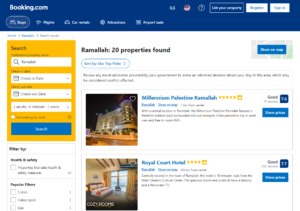Delays and cancellations have become an all too common — even expected — feature of the travel industry landscape. But that’s hardly license for 24/7 news agencies to similarly fall behind on critical tourism industry coverage.
Yet, that’s exactly what happened with Associated Press coverage of a Booking.com policy which initially appeared to be a win for the anti-Israel Boycott, Divest, Sanctions movement, but then one day later flipped into what Israel hailed as a diplomatic victory.
Associated Press immediately covered the booking site’s decision Friday to warn customers against Israeli settlements as being located in “occupied territory” and therefore posing “high risks to safety and human rights,” a policy celebrated by the reflexively anti-Israel Human Rights Watch as a “welcome step.” Yet, two days after Booking.com’s decision Saturday to apply warnings to all West Bank properties — Israeli and and Palestinian alike, a shift met by Israeli delight — AP’s story on that critical reversal is still stuck at the gate.
As of this writing, AP’s final word on the story is the outdated Sept. 30 AP article, “Booking.com adds travel warnings for West Bank settlements,” which in both the headline and throughout the text reported that Booking.com’s West Bank warnings apply singularly to Israeli settlements.
The new alert urges customers searching for rentals in Israeli settlements to review their government’s travel advisories before booking in the area, “which may be considered conflict-affected.”

A screenshot of Booking.com options for Palestinian properties in Ramallah, with a warning that the area may be considered “conflict-affected” (Oct. 3)
Yet, two other leading news agencies, Agence France Presse and Reuters, reported the very next day that Booking.com’s West Bank warning applies to both Palestinian and Israeli properties.
Online travel agency Booking.com has added warning banners to both Israeli and Palestinian properties in the occupied West Bank, the company said Saturday, under a new policy on conflict zones that Israel hailed as a “victory”.“Please review any travel advisories provided by your government to make an informed decision about your stay in this area, which may be considered conflict-afflicted,” the company’s website now says, in searches for accommodation in Jewish settlements or Palestinian localities. . . .Israel hailed the move to not distinguish between Israeli and Palestinian properties in the West Bank a “diplomatic achievement”, saying the company’s original intention was to designated Israeli settlements only as “occupied territory” and visits there as a “high risk to safety and human rights.”“We thank Booking.com for changing its decision,” Prime Minister Yair Lapid said in a statement that credited the foreign and tourism ministries for a “discrete and effective dialogue” with the company that had brought about the change.“Israel won an important victory in the battle against delegitimisation,” he said. (Emphases added.)
Online travel agency Booking.com has added safety labels to listings in the occupied West Bank, which Israel, having initially opposed the move, welcomed for not singling out Jewish settlements.
The move was rebuked by Palestinian officials, who said the advisory should only be used for Israeli settlements.
The company now posts an advisory on its website when customers search for West Bank properties in both Palestinian cities as well Israeli settlements . . .
On Sunday (Oct. 2), CAMERA notified AP yesterday about Booking.com’s policy change of one day earlier — (although presumably a news agency which so promptly reported the booking site’s news Friday would have known about Saturday’s change) — and yet AP has still failed to dispatch its intrepid reporters, leaving its news consumers straggling behind saddled with the old, outdated reported highlighting an alleged BDS victory which never got off the ground.
